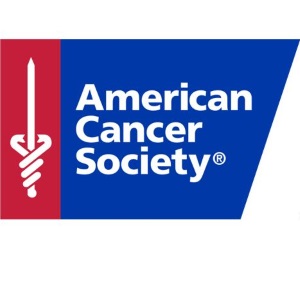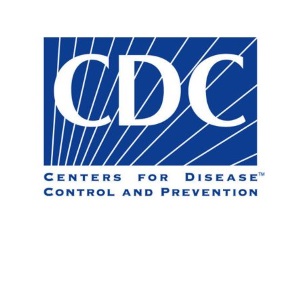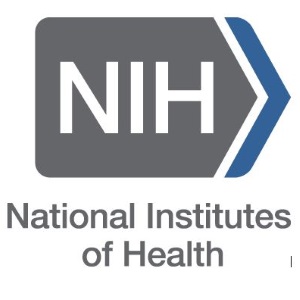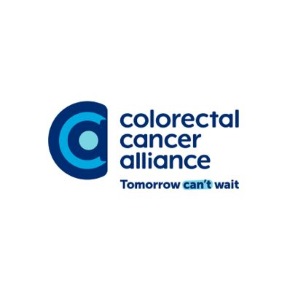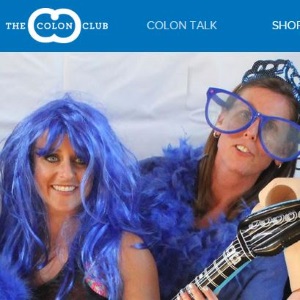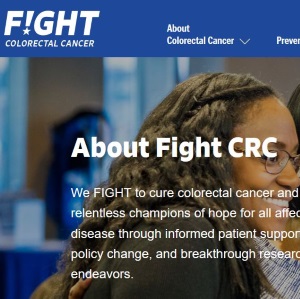Colorectal Cancer Disparities
- more likely to be diagnosed with colorectal cancer
- more likely to be diagnosed with harder-to-treat proximal (right-sided) tumors
- less likely to receive optimal surgical treatment
- more likely to die of colorectal cancer
- less likely to be diagnosed with colorectal cancer
- less likely to die of colorectal cancer
News
Data

NA=Native American 46.5, B=Black 38.6,
W=White 33.3, H=Hispanic 29.0, A=Asian/Pacific Islander 26.0
Source: National Cancer Institute Cancer
Stat Facts: Colorectal Cancer

B=Black 52.4, NA=Native American 52.3,
W=White 43.5, H=Hispanic 41.1, A=Asian/Pacific Islander 36.4
Source: National Cancer Institute Cancer
Stat Facts: Colorectal Cancer

B=Black 14.8, NA=Native American 14.4,
W=White 11.3, H=Hispanic 8.5, A=Asian/Pacific Islander 7.9
Source: National Cancer Institute Cancer
Stat Facts: Colorectal Cancer

B=Black 22.7, NA=Native American 21.3,
W=White 15.8, H=Hispanic 13.7, A=Asian/Pacific Islander 11.1
Source: National Cancer Institute Cancer
Stat Facts: Colorectal Cancer
Men and Women Diagnosed with Colorectal Cancer
Eartha Kitt
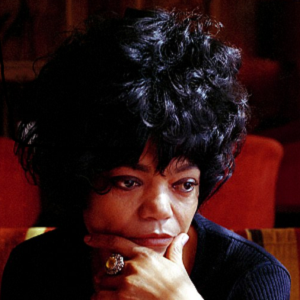
Singer and actress Eartha Kitt died from colon cancer at age 81 on Christmas Day 2008.
Towards the end of 2006, she went to a doctor to see if she could get relief from pain she felt in her hands. A series of tests revealed that Kitt was bleeding internally.
A colonoscopy led to a diagnosis of stage III colorectal cancer. She had surgery to remove her colon and nearby lymph nodes, but the cancer eventuallly returned.
Chadwick Boseman

Actor Chadwick Boseman was diagnosed with stage III colon cancer in 2016, which eventually progressed to stage IV.
He never spoke publicly about his cancer diagnosis and continued to work in films during multiple surgeries and chemotherapy.
Boseman died at age 43 in August 2020 at his home with his wife and family by his side.
Darryl Strawberry

In the middle of the October 1998 baseball playoffs, slugger Darryl Strawberry, 36, was diagnosed with colon cancer and had two feet of his colon removed.
He returned to play baseball the next year. But by 2000, the cancer had returned and spread to his kidney and lymph nodes, requiring more surgery and ending his baseball career. Today, Strawberry and his wife Tracy run a foundation dedicated to children with autism.
Kangol Kid, Early Rapper Who Sought "Roxanne," Dies of Colon Cancer at Age 55

Kangol Kid, a rapper in the group UTFO and a key contributor to the 1984 single “Roxanne, Roxanne,” one of the most influential and widely imitated songs of commercial hip-hop’s early years, died from colon cancer in December 2021. He was 55.
Kangol Kid was diagnosed 10 months earlier with stage III colon cancer. Finding blood in or on his stool was Kangol’s on-again, off-again warning sign that he ignored until it was too late. “Being a typical man, my mindset was it’ll get better, it’ll be fine,” Kangol said in April.
There’s a deep-rooted reason why Black men avoid talking about health concerns and getting treatment, Kangol explained. “We ignore it. We don’t take it seriously. That’s how we deal with the facts,” he said. “It’s that whole man-like mentality. You’re raised to deal with things and keep it in.”
Silence is a deadly tradition passed from one generation of Black men to the next. “A man would say to his son, ‘Toughen it up,’” Kangol said. “‘You can deal with that, be brave, be strong.’
Now Kangol said he was fearlessly challenging those notions by using his voice. “Little by little, we’re undoing what has been done for generations. The new look for hip hop and cancer is to go get yourself checked out before it happens.”
Source: “Kangol Kid: The New Look for Hip Hop and Cancer” by Steven Bushong on the Colorectal Cancer Alliance website (April 27, 2021)
Hip-Hop pioneer Doug E. Fresh Documents Colonoscopy Experience In Honor Of Kangol Kid
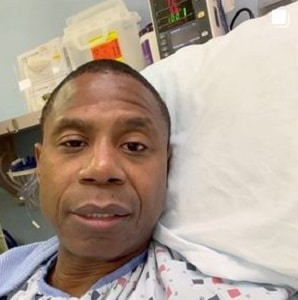
Doug E. Fresh took to Instagram to share his recent colonoscopy experience in honor of the late Kangol Kid. The rapper shared all he could from the medical procedure with a message to viewers on the importance of preventative care.
“This is for my brother #kangolkid and all those who passed from this horrible disease,” he wrote on Instagram. “We have to be proactive about our health. To all my brothers out there, let’s do a better job of caring for ourselves.”
Source: “Doug E. Fresh Documents Colonoscopy Experience In Honor Of Kangol Kid” by Demicia Inman on the Vibe website (March 28, 2022)
John Wagner
John Wagner was in his 30s, had no family history of colon cancer and considered himself a healthy guy when he started feeling weak with severe constipation and blood in his stool. Multiple doctors sent him home without ever screening him for cancer.
“I kept asking and they said I didn’t need it, I was too young.
If it wasn’t for an ER nurse, no telling what might have happened,” he says. At the ER, a colonoscopy revealed what he feared: stage IV colon cancer.
A 3-minute video from television station WHAS11 of Louisville, Kentucky.
Shannon
“When I was 23, I went to see my OBGYN,” says Shannon. “I had stomach aches and was dealing with fatigue and same blood in my stool. She told me that it was diet and stress. So I changed my diet. But the problems never really went away. I just got used to them.
“When I was 31, I went to see my primary care physician and told her my symptoms. She got greatly concerned and told me that I needed a colonoscopy. I was really reluctant to do it. But my husband convinced me. The following day after the colonoscopy, I got the phone call that I had stage four colorectal cancer.
I’ll never forget that moment. They ended up removing two feet of my colon. Six months of Chemo. And then daily radiation. Living with this is a challenge. But I have amazing family and friends.”
A 6-minute video from Pfizer.
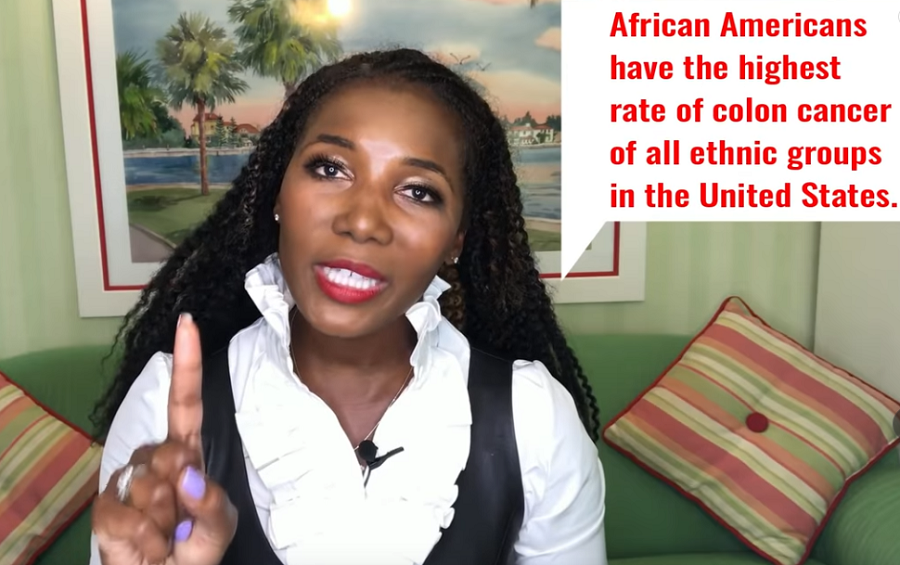
Frita McRae Fisher, MD
Colorectal Cancer Disparities
Incidence
Black men and women. Colorectal cancer is the third most common cancer in Black men and women. Black people have the second-highest incidence of colorectal cancer in the US, following the Alaska Native/American Indian population. Incidence rates are about 20% higher in Black people than in White people among both men and women.
The incidence was historically higher in White people. The crossover occurred in the early 1990s because of changing patterns in risk factors and slower dissemination of screening among Black people. From 2009 to 2018, incidence rates for colorectal cancer decreased by about 3% per year among Black people versus 2% per year among White people. This masks the increasing incidence among people younger than 50 years of age, which is much steeper in White people (2% per year) than in Black people (0.5% per year).
Source: American Cancer Society. Cancer Facts & Figures for African American/Black People 2022-2024.
For early-onset colorectal cancer, the steepest increase is among Whites and American Indians and Alaska Natives. As a result, incidence rates in Whites ages 20-49 years are now equivalent to those in Blacks, despite being 40% higher in Blacks during 1995-1996.
Source: American Cancer Society. Colorectal Cancer Facts & Figures 2020-2022. Atlanta: American Cancer Society; 2020.
During 2014-2018, Black people had the highest incidence of colorectal cancer in the U.S. compared to any other racial or ethnic minority group, and the incidence was nearly 15 percent higher compared to White people.
Historically, colorectal cancer was more common in White populations until the early 1990s, when the colorectal cancer incidence became higher in Black populations due to an increase in the associated risk factors as well as lower screening rates for colorectal cancer.
Even though the incidence rates are declining at a faster pace among the overall Black population compared to the overall White population (three versus two percent annual decline from 2009 to 2018, respectively), it is concerning that among individuals who are younger than 50 years of age the yearly decline for the same period was four times lower in Black people compared to White people.
Source: American Association for Cancer Research Cancer Disparities Progress Report 2022.
Hispanic men and women. Colorectal cancer incidence rates among Hispanics are 7% lower for men and 16% lower for women than for White men and women, and have been declining since at least the mid-1990s. From 2006 to 2015, incidence rates decreased by 1.6% annually among Hispanics, similar to trends among Whites, although rates in recent years may be leveling off among women. Notably, incidence rates are not declining in all states; for example, rates remain stable among Hispanic men in California, possibly in part due to underutilization of screening.
Source: American Cancer Society. Cancer Facts & Figures for Hispanics/Latinos 2018-2020. Atlanta: American Cancer Society, 2018
Asian/Pacific Islanders. Although the incidence in Asian/Pacific Islander men overall is 25% lower than in White men, rates in Japanese men are 23% higher.
Source: American Cancer Society. Colorectal Cancer Facts & Figures 2020-2022. Atlanta: American Cancer Society; 2020.
American Indian/Alaska Native. Alaska Natives have the highest colorectal cancer incidence rates in the US. Colorectal cancer has been the most commonly diagnosed cancer in Alaska Natives since the early 1970s for reasons that are unknown, but may include a higher prevalence of risk factors, such as a diet high in animal fat and low in fruits and vegetables, vitamin D deficiency, smoking, obesity, and diabetes.
Source: American Cancer Society. Colorectal Cancer Facts & Figures 2020-2022.
Compared to White people, AI/AN people had a higher incidence rate during 2014-2018 for colorectal cancer.
Source: American Association for Cancer Research Cancer Disparities Progress Report 2022.
Screening
Tumor subtypes
Black men and women. Black people are about 30% more likely than White people to be diagnosed with proximal (right-sided) tumors, which have less favorable outcomes.
Source: American Cancer Society. Cancer Facts & Figures for African American/Black People 2022-2024.
Unfavorable tumor characteristics are estimated to account for 26% of the black-white survival disparity in patients younger than age 65, but 40%-50% in older patients. For example, black patients are about 4 times more likely to be diagnosed with proximal (right-sided) tumors, which have less favorable outcomes than whites.
Source: American Cancer Society. Cancer Facts & Figures for African Americans 2019-2021. Atlanta: American Cancer Society, 2019.
Stage at diagnosis
Black men and women. For blacks, 37% of colorectal cancers are diagnosed with local-stage disease compared to 39% in whites.
Source: American Cancer Society. Cancer Facts & Figures for African Americans 2019-2021. Atlanta: American Cancer Society, 2019
Hispanic men and women. A similar proportion of Hispanics (36%) and whites (37%) are diagnosed with localized disease, despite lower rates of screening and less access to timely medical care among Hispanics.
Source: American Cancer Society. Cancer Facts & Figures for Hispanics/Latinos 2018-2020. Atlanta: American Cancer Society, 2018
Treatment
Black men and women. Numerous studies have documented that Black people with colorectal cancer are less likely than White people to receive recommended surgical treatment, radiation, and chemotherapy. Additionally, Black people are more likely to have treatment delays, even within similar socioeconomic backgrounds.
Source: American Cancer Society. Cancer Facts & Figures for African American/Black People 2022-2024.
After controlling for differences in risk factors, black individuals are no more likely than whites to develop adenomas or colorectal cancer, but are less likely to receive timely follow-up of a positive screening test and/or high-quality colonoscopy.
Source: American Cancer Society. Colorectal Cancer Facts & Figures 2020-2022. Atlanta: American Cancer Society; 2020.
Clinical trials
Blacks and Hispanics are under-represented in clinical trials that look at biomarkers which can help identify appropriate personalized treatments. Whites are over-represented in these trials.
Source: “Racial and Ethnic Disparities Among Participants in Precision Oncology Clinical Studies” by Christopher M. Aldrighetti et al. (November 8, 2021).
5-year survival
Black men and women. The 5-year relative survival rates for colorectal cancer improved from 45% in 1975-1977 to 59% in 2011-2017 among Black people versus 50% to 65% among White people. Some of this survival disparity is due to later-stage diagnosis among Black people, although this gap has narrowed: 34% of colorectal cancers in Black people are diagnosed at a localized stage compared to 35% in White people. Five-year relative survival rates remain lower in Black than in White patients for each stage of diagnosis. Racial disparities in stage-specific survival largely reflect differences in treatment, comorbidities, and tumor characteristics.
Source: American Cancer Society. Cancer Facts & Figures for African American/Black People 2022-2024.
Hispanic men and women. Five-year survival among Hispanics diagnosed at a localized stage is 91%, declining to 71% and 16% for those diagnosed at regional and distant stages, respectively.
Source: American Cancer Society. Cancer Facts & Figures for Hispanics/Latinos 2018-2020. Atlanta: American Cancer Society, 2018
Mortality
Black men and women. Death rates in Blacks are almost 40% higher than those in Whites and double those in Asians/Pacific Islanders.
Source: American Cancer Society. Colorectal Cancer Facts & Figures 2020-2022. Atlanta: American Cancer Society; 2020.
Death rates in Whites began a slow decline in the early 1970s that accelerated over time. In contrast, death rates in Blacks increased from the early 1970s until 1990, then decreased sluggishly during the 1990s before matching the decline in whites in the early 2000s. As a result of these divergent trends, although death rates in Blacks were 10% lower than those in Whites in the early 1970s, they were almost 50% higher in 2005. The widening racial disparity was largely driven by trends for distant-stage disease, which declined in Whites while remaining stable in Blacks through the mid-2000s. About half of the racial disparity in mortality is attributed to a combination of less screening and lower stage-specific survival rates among blacks.
Source: American Cancer Society. Colorectal Cancer Facts & Figures 2020-2022. Atlanta: American Cancer Society; 2020.
Colorectal cancer is the third-leading cause of cancer death in both Black men and women. Similar to incidence rates, colorectal cancer mortality rates were historically higher in White people than in Black people but have reversed and are now 44% higher in Black men and 31% higher in Black women compared to Whites.
This gap is two times larger than the disparity for incidence but has begun to shrink in recent years because of steeper declines in death rates from 2010 to 2019 in Black people (about 3% per year) than in White people (about 2% per year). One study estimated that 19% of the racial disparity in mortality can be attributed to less screening and 36% to lower stage-specific survival among Black people.
Source: American Cancer Society. Cancer Facts & Figures for African American/Black People 2022-2024.
There is a major disparity between Black and White populations in mortality rates for colorectal cancer, which are 44 and 31 percent higher in Black men and women, respectively, compared to White men and women.
Source: American Association for Cancer Research Cancer Disparities Progress Report 2022.
Hispanic men and women. Colorectal cancer is the third-leading cause of cancer death among both Hispanic men and women. Hispanic men and women have colorectal cancer death rates that are 13% and 26% lower, respectively, than those in whites, although there are striking disparities by geography and place of birth. For example, within California, the death rate in US-born Mexican men is nearly double that of their foreign-born counterparts. From 2007 to 2016, death rates decreased by about 2% per year among Hispanics, similar to declines among whites.
Source: American Cancer Society. Cancer Facts & Figures for Hispanics/Latinos 2018-2020. Atlanta: American Cancer Society, 2018
Alaska Natives have the highest colorectal cancer mortality rates in the US, double the rate in Blacks.
Source: American Cancer Society. Colorectal Cancer Facts & Figures 2020-2022.
Colorectal Cancer and Hispanics
Hispanics Lagging in Colorectal Cancer Screening

One in two Hispanic adults between 50 and 75 years of age are not getting tested as recommended, putting Hispanics at increased risk for advanced-stage colon cancer.
Because of lower screening rates, colon cancer causes about eleven percent of cancer deaths among Hispanic males and nine percent of Hispanic females.
Read more at “Hispanics Are Less Likely to Get Screened for Colon Cancer” on the Stop Colon Cancer Now website (July 1, 2021)
Colorectal Cancer in Puerto Rico
“Colorectal cancer is the second leading cause of cancer death in Puerto Rico,” says Tristana Vásquez who was diagnosed at age 38 with colon cancer that had spread to her lungs .
“I do think there is an apprehension in the Hispanic community, specifically Puerto Rico, to not get screened when it’s preventable. Most cases of this disease are preventable. So it’s important not to be afraid.”
“We tend to just feel unwell and then go to the doctor when we cannot do anything else. Knowing whatever you have and attacking it and dealing with it at an early stage, it’s going to get better results.”
A 5-minute video from the American Association for Cancer Research
Why are Hispanics More Likely to Be Diagnosed with Late-Stage Colorectal Cancer?

“I think the number one contributing factor is they’re ashamed of seeking advice for changing bowel habits or for any type of symptoms,” says Roberto Rodriguez-Ruesga, MD, a colorectal surgeon in Dallas (pictured above).
“They just put up with symptoms until it gets to a point that is unbearable. Unfortunately, by then, it’s too late.
Read more at “Study Shows Latino Adults More Likely To Receive Late-Stage Colon Cancer Diagnosis Than White Adults” by Sam Baker on the KERA (Dallas) radio station website (March 22, 2021)
Colorectal Cancer in Younger People
"Rising Levels of Colon Cancer Particularly in 20 to 30 year olds"
“We are unfortunately seeing rising levels of colon cancer in millenials, particularly 20 to 30 year olds,” says Erin O. Lange, MD, University of Washington colorectal surgeon.
“Important preventive measures are to pay attention to your body. Not all colon cancers give us symptoms.
But for those that do patients should pay attention to those symptoms and to take them seriously, to talk with their doctor about things that don’t see right about their body. And also to know and understand their own family history.”
A 2-minute video from the University of Washington
"It's happening in both men and women and all around the world"
“Lately, since the 1990s, we have been noticing a steady rise in the rate of rise in people under the age of 50,” says Kimmie Ng, MD, director of the Young-Onset Colorectal Cancer Center at Dana-Farber Cancer Institute in Boston. She was interviewed shortly after the death of Chadwick Boseman.
“It’s happening in both men and women, all around the country and all around the world. And the reasons for this are not completely clear right now, although we highly suspect that environmental factors are at play. Obesity and sedentary behavior may play a role.”
A 3-minute video from NBC’s Today Show.
"A Rising Tide of Younger Colorectal Cancer Patients"
“Probably 10 years ago, maybe a little longer, these ‘kids’ began to trickle into my colorectal cancer clinic,” says says John L Marshall, MD, of the Lombardi Comprehensive Cancer Center at Georgetown University.
“Now today (2018), I can go to clinic, of the 30 patients, probably half of them are under the age of 50.
While we are doing better overall, there’s a rising tide of young people, the under-age 50, 20s, 30s, with colon cancer.”
A 1-minute video from Medscape, a website for medical professionals.
Interview: Younger Patients Increasingly Being Diagnosed with Late-Stage Colorectal Cancer
Swati Patel, MD, of the University of Colorado Cancer Center, who co-published research showing a steep rise in colorectal cancer cases in people in their 20s and 30s, answers questions about what these research findings mean for younger adults and when they should consider getting screened for colorectal cancer.
Source: “Younger Patients Increasingly Being Diagnosed with Late-Stage Colorectal Cancer” by Rachel Sauer on the University of Colorado School of Medicine website (March 23, 2022)
Voices about Colorectal Cancer
Pascale White, MD
“When we say disparity, that means that things are not fair,” says Pascale White, MD, Director of the Gastroenterology Clinic at the Icahn School of Medicine at Mount Sinai in New York.
“Why are we being diagnosed with colorectal cancer at higher rates? Why are we dying at higher rates? Something’s wrong with that.
There are three different kinds of barriers: patient barriers; physician barriers; and health system barriers.
And systemic racism is an underpinning to these barriers, as well. Once we know the problems, we can then try to solve them.”
A 5-minute video on Facebook with Sylvia Gonsahn-Bollie, MD.
Jamie Foxx
“If you’re a man or woman 45 or older, I’m talking to you.
We’re all busy and we think, when would we fit colorectal screening in? Well, fit it in. It just might mean more time with your family down the road.
I’ve lost good friends, young friends, to colon cancer.
Don’t make the mistake of waiting until you have symptoms or think that you have no risk because it doesn’t run in your family. Everybody needs to be screened.
A 1-minute video with Jamie Foxx from Stand Up to Cancer.
Candace Henley
Candace Henley, 35 and mother of 5 daughters, was diagnosed with colorectal cancer in 2003, after being misdiagnosed for years, and had 90 percent of her colon removed.
Denied Social Security disability, Henley became homeless with her children and tried to kill herself. Hospitalized in a psych ward, “I asked God for forgiveness and said I would do everything I could to raise awareness and save other people from the same fate I went through.”
In 2010, Henley started the Blue Hat Foundation which raises awareness of colorectal cancer in minority and medically-underserved communities.
A 4-minute video from the American Association for Cancer Research
“You can’t be scared to go see a doctor. You have to break that fear."

“It can be tough to talk about colon cancer screening amongst men, but it’s important to know that we are talking about things that are preventable,” says comedian Dannon Green.
“Since I’ve had prostate cancer, I’ve had four colonoscopies in the last 10 years. They are simple and painless. They can save your life.”
“The biggest obstacles that have caused men so many health problems historically have been machoness and lack of information. A lot of times a man won’t even go to a doctor unless his wife or his girlfriend are forcing him to go.
“You can’t be scared to go see a doctor. You have to break that fear. And once you break that, things will be much better for you healthwise.”
Source: “Annual Black men’s empowerment event will focus on colon cancer screening and early detection.” (January 19, 2022)
Actor Terence Howard Grieves for His Mother Who Died From Colorectal Cancer
“She shaped me as an actor as a musician, as a human being. So when my mother was diagnosed with colon cancer, it was like our whole family got cancer. And she died when she was only 56.
Hopefully my heartbreak is your wake up call. Screening finds pre-cancerous polyps so they can be removed before they turn into cancer. I’ve been screened. Please get screened.
I’d do anything to have my mother here. Please do all you can to stay around for yourself and for your family. Screening saves lives.”
A 1-minute video from the Centers for Disease Control and Prevention (CDC)
About Colorectal Cancer
Whether you or a loved one are worried about getting colorectal cancer, have just been diagnosed, or are going through colorectal cancer treatment, this detailed information can help you find the answers you need.
Learn what colorectal cancer is, how to lower your risk, and about the symptoms, risk factors, and screening tests for colorectal cancer.
Learn more about colorectal cancer prevention, screening, treatment, statistics, research, clinical trials, and more.
Risk Factors for Colorectal Cancer?
A 2-minute video
What are the Symptoms of Colorectal Cancer?
A 1-minute video
How is Colorectal Cancer Diagnosed?
A 1-minute video
Frita McRae Fisher, MD, is a triple board certified physician in Nephrology, Internal Medicine, and Pediatrics based in Atlanta.
"It's really the length of time you notice changes in bowel habits or pain"
Colorectal surgeon Zuri Murrell, MD, of the Colorectal Cancer Center at Cedars-Sinai in California answers questions about colorectal cancer posted on Facebook.
“Are there early symptoms of colon cancer? The hard part about colon cancer is that the early symptoms are very non-distinct. It’s basically a change in bowel habits and occasional abdominal pain. It’s really the length of time that you notice these changes. So if you have these changes and they lasted for a month, that’s when you need to see your doctor.”
“When should people start getting colonoscopies? This is a very important question that really goes to the heart of knowing our family history. I’m 44 years old. About a year and a half ago, I had a colonoscopy because I knew my father had a large number of polyps at a young age.
And guess what? Even though I try to eat healthy, even though I eat a lot of fruits and vegetables, I still had a large pre-cancerous polyp on the right side of my colon that if I had waited, I would have had colorectal cancer.
So, the most important thing is knowing your family history. That means that once you have a colonoscopy, you actually share the results with your children. My kids hear about my colon history all the time.”
A 19-minute video from the Cedars-Sinai health organization of Los Angeles.
"Fewer than one in 10 polyps turn into colorectal cancer"
“Colorectal cancer can start with abnormal cell growth and inflammation in the colon or rectal tissue,” says Freda Lewis-Hall, MD, the chief medical officer for Pfizer. “But most start as growths or polyps in the innermost lining of the colon or of the rectum.”
“The good news is fewer than one in 10 polyps turn into cancer. And the even better news is that of those polyps that do have abnormal cell growth, they can still at early stages be removed surgically before they become invasive cancers.”
“Let’s talk about some of the symptoms of colorectal cancer. You want to look for changes in bowel habits, such as diarrhea, constipation, the narrowing of stool that lasts for more than just a few days. And also the feeling that you have to have a bowel movement that isn’t relieved after you’ve actually had a bowel movement.
There are other things that should concern you. Rectal bleeding. dark stools, weakness, and fatigue, unintended weight loss pain, and abdominal cramping. Even if you don’t have symptoms or risk factors, it’s recommended that you start colon cancer screening beginning at the age of 50 [now 45]”.
A 6-minute video from Pfizer
Colorectal Cancer Screening Recommendations
Colon Cancer has been called the most fatal, yet the most preventable disease. For those uneasy with colorectal cancer screening, “colon cancer can kill you, embarassment will not,” says John Kisiel, MD, gastroenterologist at the Mayo Clinic.
Source: Who should be screened for colorectal cancer?
“Over the past decade, it’s estimated that screenings have reduced the risk of colon cancer by 77 percent. Unfortunately, it’s also estimated that 40 percent of at-risk persons have never been screened.”
Source: University of California at San Diego (2018)
U.S. Preventive Services Task Force (2021)
The USPSTF recommends offering colorectal cancer screening starting at age 45 years.
The USPSTF recommends that clinicians selectively offer screening for colorectal cancer in adults aged 76 to 85 years. Evidence indicates that the net benefit of screening all persons in this age group is small.
In adults 86 years or older, evidence on benefits and harms of colorectal cancer screening is lacking, and competing causes of mortality likely preclude any survival benefit that would outweigh the harms of screening.
Source: U.S. Preventive Services. Colorectal Cancer: Screening (2021)
The U.S. Preventive Services Task Force is an independent, volunteer panel of national experts in disease prevention and evidence-based medicine who make evidence-based recommendations about clinical preventive services. Most private insurance plans are required to cover without a copay recommended preventive services that receive a grade of A or B from the Task Force.
National Compehensive Cancer Network (2021)
People at average risk should start screening at 45 years of age. Some people who have an increased or high risk of colorectal cancer should talk with their health care provider about whether to start screening before age 45.
Black individuals should begin earlier than age 45 if colorectal cancer runs in their family.
People in good health should undergo colorectal cancer screening up to age 75.
People between 76 and 85 should talk with their health care provide about the pros and cons of screening in light of their health. After 85, colorectal cancer screening is not needed.
Source: National Comprehensive Cancer Network: Colorectal Cancer Screening (2021)
U.S. Multi-Society Task Force of Colorectal Cancer (2021)
For average risk individuals: We suggest starting CRC screening at age 45 using either colonoscopy or fecal immunochemical test (FIT) as the primary screening modality.
African Americans should start screening at age 45.
For those with a family history of colorectal cancer: We recommend starting screening at age 40 in individuals with one or two first degree relatives with colorectal cancer or advanced colorectal polyps. If the first degree relative is younger than 60, or there are two or more first degree relatives with colorectal cancer or advanced colorectal polyps at any age, colonoscopy should be used, and screening repeated at five-year intervals. If the first degree relative is age 60 or older, any screening modality can be used and, if normal, follow average risk screening intervals. For individuals with history of only one second degree relative with colorectal cancer or advanced polyps, we suggest using average risk recommendations.
For individuals older than 75: The decision to screen should be individualized.
Source: American College of Gastroenterology Issues Updated Colorectal Cancer Screening Guidelines (2021) and ACG Clinical Guidelines: Colorectal Cancer Screening 2021.
Note: The U.S. Multi-Society Task Force of Colorectal Cancer represents the American College of Gastroenterology, the American Gastroenterological Association, and the American Society for Gastrointestinal Endoscopy.
American Cancer Society (2018)
Adults ages 45 and older should undergo regular screening with a high-sensitivity stool-based test or structural examination, such as a colonoscopy, depending on patient preference and test availability. Positive results from any non-colonoscopy test should be followed up with a timely colonoscopy.
American Cancer Society researchers found that blacks were 30% more likely than whites to be diagnosed with colorectal cancer after a negative colonoscopy but before the next recommended screening, and more often received colonoscopies from less-skilled physicians.
Source: American Cancer Society. Cancer Facts & Figures for African Americans 2019-2021. Atlanta: American Cancer Society, 2019
Recent news about colorectal cancer screening
Details About the Three Main Screening Methods
FIT Home Screening Test
This is a colon cancer screening option that patients can perform from home, called the fecal immunochemical test (FIT).
This tests a small sample of the stool for human blood that cannot be seen with the naked eye. The sample is mailed to a lab and the results reported to your healthcare provider.
A 2-minute instructional video from UCLA Health.,
Colonoscopy
Darrell Gray, II, MD of The Ohio State University Wexner Medical Center shows what a colonoscopy sees as it snakes through the large intestine.
“We inspect carefully to look for polyps. Polyps are ingrowths of tissue that can occur within the colon and they can also be precancerous. If found, they would be removed at the time of the colonoscopy.”
A 4-minute video from the American College of Gastroenterology
Flexible Sigmoidoscopy
A Flexible Sigmoidoscopy only looks at the left side of the colon. It does not see the middle or the end of the colon as does a complete colonoscopy.
Sometimes this procedure can be done in the office without sedation. So it’s important for patients who are unable to receive sedation or to undergo a full colonoscopy that this is an accepted screening method.
A 3-minute video from the American Cancer Society.
Insurance Coverage of Colorectal Cancer Screening
Medicare
Medicare Covers FIT test at no cost for those age 50 or older; Flexible sigmoidoscopy at no cost when the test is done for screening; Colonoscopy at no cost when the test is done for screening. These tests are covered as long as the doctor accepts the amount Medicare pays as the full payment. If the test results in the biopsy or removal of a growth, it’s no longer a “screening” test, and there can be a co-insurance and/or a co-pay.
Private Health Insurance
Private insurance The Affordable Care Act (Obamacare) requires health plans that started on or after September 23, 2010 to cover colorectal cancer screening tests.
In most cases there should be no out-of-pocket costs, such as co-pays or deductibles.
Even if you have a “grandfathered plan,” it may still have coverage requirements from state laws, which vary, and other federal laws.
Medicaid
Medicaid Coverage for colorectal cancer screening varies by state.
Unlike Medicare, there’s no federal assurance that all state Medicaid programs must cover colorectal cancer screening in people without symptoms.
For more information, see “Insurance Coverage for Colorectal Cancer Screening” from the American Cancer Society (2021)
Paying for your Colonoscopy
Under the Affordable Care Act, you can get certain preventive health care tests done for free. Colonoscopy is one of these tests. It is often free, but there are some cases in which patients must pay part of the cost. Congress recently passed a new law that will stop unexpected bills for screening colonoscopy gradually between 2022 and 2030, but for now this resource contains the most current information.
By answering a few questions, you can figure out what to expect to pay for your colonoscopy. Talk to your doctor’s billing team or your health plan if you have more questions.
See “Paying for your colonoscopy” from the American Gastroenterological
Association (AGA) .

Rachel Issaka, MD
"I'm excited for Black people and other high-risk populations"
“The Affordable Care Act (Obamacare) states that anything graded A or B by the U.S. Preventive Services Task Force must be covered by insurers in the country,” says Rachel Issaka, MD, a gastroenterologist at the Fred Hutchinson Cancer Research Center in Seattle.
“So with age 45 becoming a grade B recommendation for when to begin screening, I’m excited for Black people and other high-risk populations who needed earlier screenings to have this important test covered.”
The Colonoscopies of Actor Will Smith and Journalist Nicholas St. Fleur
Will Smith Records His Colonoscopy and Is Surprised by What Was Found
Actor Will Smith, 50, recorded the story of his first colonoscopy in 2019 with the assistance of Ala Stanford, MD. Doctors removed one precancerous polyp from his large intestine.
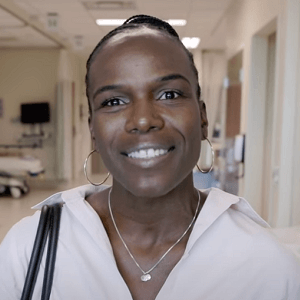
“You had a polyp there,” Stanford tells Smith. “Had you not known, it continues to grow and grow. And in African American men in particular, the right colon is where cancers hide,” she says.
“When I decided I wanted to shoot this, it was much more this will be cool, this will be fun. I didn’t realize that there would be a precancerous polyp that would get found out of it,” Smith marveled.
An 18-minute video from Will Smith’s Youtube channel.
Chadwick Boseman's death made me realize I need to be screened"
“My mother had colon cancer at the age of 34, so I knew that I was at a higher risk to develop the disease myself,” says science journalist Nicholas St. Fleur.
“So once I saw that Chadwick Boseman passed away from colon cancer, it made me realize that I need to be more serious about getting checked myself.
I knew I had a family history, but I didn’t realize that, as a Black man, I was at higher risk as well.”
St. Fleur documented his screening from start to finish.
“I wanted to combat any stigmas associated with it because it is such a personal part of your body and it is something that many people don’t want to go through because they might find it scary.”
A 2-minute video from ABC News.
Watch the 5-minute documentary about his colonoscopy on the STAT website. Spoiler alert: St. Fleur is going to get screened again in 5 years.
Drama about Regret Over Missed Colonoscopy
Eddie T regrets not insisting that his now-deceased best friend Archie get a colonoscopy which might have saved his life, in a dramatization.
“If anybody needed to get that colonoscopy, it was Archie. We all kept after him. I wish I’d have tied him up and dragged him. My best friend! I just miss him in so many ways. All gone now.”
“His stage 4 colon cancer could have have been caught and probably been cured all right at stage 1. A colonoscopy! Just a colonoscopy. Nobody likes them. But they save lives. And we Black folk really need to pay attention cause it’s killing more of us than anybody.”
A 16-minute video drama from the Baylor College of Medicine
“People say what you don’t know won’t kill you. What you don’t know will kill you. That’s the problem when it comes to your health,” says Orlena. “I went almost two years having issues and symptoms that literally could have killed me. A colonoscopy saved my life.”
Her colonoscopy found a huge tumor that hadn’t yet turned cancerous.
“You don’t want to find out you have a massive tumor and you didn’t do anything about it. And the only way you could do something about it is go get a colonoscopy? Go get a colonoscopy. It’s not that bad.”
A 5-minute video from Capital Digestive Care of the Washington DC area
"A Colonoscopy Saved My Life"
"I Believe My Colonoscopy Saved My Life"
“My name is Yolanda and I’m 44 and I believe my colonoscopy saved my life. People that don’t think they need to be screened need to come talk to me.”
A 4-minute video from the NorthShore University HealthSystem in Chicago.
A Funny Reminder About a First Colonoscopy
“Some of your older friends might already be doing it. Your mother and I have done it and we’re happy to tell you all about it.”
A 1-minute video from the Centers for Disease Control and Prevention (CDC)
Support Groups
“We are the Colorectal Cancer Alliance, formerly the Colon Cancer Alliance. We empower a nation of allies who work with us to provide genuine support for patients and families, caregivers, and survivors; to raise awareness of preventive measures; and inspire efforts to fund critical research.”
The Colon Cancer Coalition is “a national coalition of people determined to end colorectal cancer deaths by increasing screening and educating others about the signs and symptoms of this treatable disease. We want all people to understand their risk factors and get the right screening at the right time.”
“The Colon Club was one of the first organizations to recognize the importance of early age onset (<45 years old) colorectal cancer, seeking to raise awareness that it is not ‘an old man’s disease.’ The Colon Club family seeks to provide support and education in out-of-the-box ways to end the stigma surrounding talks about our bowel function and habits.”
“Colontown is an online community of more than 100 “secret” groups on Facebook for colorectal patients, survivors, and care partners. There are separate neighborhoods focused on patients with different stages of disease, the differing types of treatment, and special interests. Membership is by application only. Fill out the registration form, and you will be contacted shortly by one of our administrators.”
Fight Colorectal Cancer provides “balanced and objective information on colon and rectal cancer research, treatment, and policy. We are relentless champions of hope, focused on funding promising, high-impact research endeavors, while equipping advocates to influence legislation and policy for the collective good.”
“Michael’s Mission” is focused on improving the quality of life and treatment options for those suffering from colorectal cancer through education, research and patient support.” Michael’s Mission was formed as a way to honor and remember Michael Soussa, who passed away from colorectal cancer at the age of 33 after multiple surgeries and almost 40 months of chemotherapy and radiation.
The Blue Hat Foundation is a colorectal cancer organization whose mission is to educate, raise awareness, and provide resources to free screenings for minority and medically underserved communities. We work hard to take care of the neediest members of our community and provide them with unconditional support. We are committed to a single goal: helping the fight against colorectal cancer.
Stop Colon Cancer Now is a network of expertly trained gastroenterologists that span 32 states and the District of Columbia. Our physicians combat the second deadliest form of cancer, colon cancer, through screenings and community education.
Active Colorectal Cancer Facebook Pages
Downloads

Short, simple guide to help understand the next steps if you or someone you know has just been diagnosed with colon or rectal cancer. From the American Cancer Society.
Free download here
A 48-page booklet designed to explain some of the medical terms doctors may use when talking about your cancer and help you keep track of the specifics of your colorectal cancer diagnosis and treatment plan. From the American Society of Clinical Oncology, a professional organization for physicians and oncology professionals caring for people with cancer.
Free download here
72-page step-by-step guide to colorectal cancer care options likely to have the best results, based on treatment guidelines used by health care providers worldwide. Designed to help you discuss cancer treatment with your doctors.
From the National Comprehensive Cancer Network, an alliance of leading cancer centers across the United States devoted to patient care, research, and education.
Free download here

National Comprehensive Cancer Network Guidelines for Patients are developed by the National Comprehensive Cancer Network, an alliance of leading cancer centers across the United States devoted to patient care, research, and education. The Guidelines present information in an easy-to-learn format for people with cancer and those who support them and explain the cancer care options likely to have the best results.
Publications
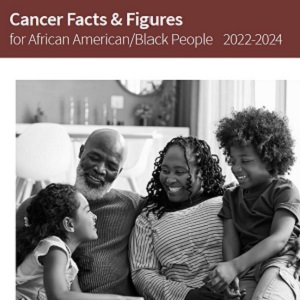
American Cancer Society. American Cancer Society. Cancer Facts & Figures for African American/Black People 2022-2024.

American Association for Cancer Research: Cancer Disparities Research Report 2020
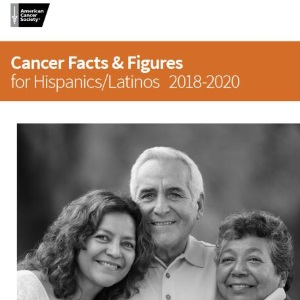
American Cancer Society. Cancer Facts & Figures for Hispanics/Latinos 2018-2020. Atlanta: American Cancer Society, 2018













